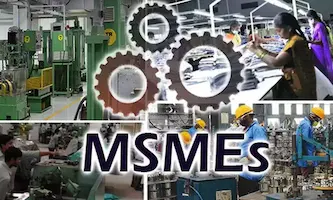
Over 90% of businesses worldwide are MSMEs, which also account for 60-70% of all employment and 50% of global GDP. MSMEs support the livelihoods of the poor, women, youth, and other vulnerable groups, as well as the local and national economy. The Sustainable Development Goals (SDGs), which were introduced by the United Nations in 2015, depend heavily on MSMEs. The 17 Sustainable Development Goals (SDGs) are top priorities for all nations because they aim to eliminate inequality, alleviate poverty, enhance health and education, combat climate change, safeguard the environment, and promote economic growth. The global COVID-19 pandemic, the conflict in Ukraine, and the impact of climate change causing climatic events such as floods, droughts, intense heatwaves, and sea level rise are just a few of the crises facing micro, small, and medium-sized businesses today in developing nations – by 2050, the World Bank predicts that over 140 million people may be compelled to relocate within their own nations due to the effects of climate change on agriculture availability. These crises pose a serious threat to MSMEs’ sustainability and resilience.
Small businesses in poor nations are among those most concerned about climate change, according to research by the International Trade Centre (ITC): 68% of businesses in sub-Saharan Africa feel that environmental hazards are significant to impacting their business. Access to capital is widely cited as a major barrier to the resilience, growth, and sustainability of MSMEs. The potential demand for MSME finance in developing economies is estimated at $8.9 trillion, compared to the present credit supply of $3.7 trillion, according to a World Bank and IFC study conducted in 128 countries – the financial deficit from formal MSMEs in these developing nations is $5.2 trillion, which is equal to 19% of the GDP of all these 128 nations. Additionally, the potential demand for financing from unregistered businesses in emerging nations is estimated to be $2.9 trillion, which is equal to 10% of their GDP. The United Nations claims that this gap exists because MSMEs lack formal accounting practices, traditional collateral is scarce, and they lack a credit history. Additionally, commercial financial service providers lack the specialized risk models necessary to assess MSMEs for credit eligibility even though they have a solid track record and low default rates. Because of this, both formal and informal MSMEs in low-income countries are unable to acquire the necessary financing, which limits their capacity to create new goods and grow their businesses. MSMEs often struggle with other development issues, such as inadequate access to energy and limited technology and human resource capabilities. MSMEs find it difficult to adapt to the impacts of climate change, such as floods, droughts, and sea level rise, as a result of all of these obstacles. Natural disasters brought on by climate change burden government finances by causing loss of crops, changes in supply and demand, damage of company and personal assets, job losses, and loan defaults. Due to a lack of resources, money, and time to prepare for or deal with the effects of this unprecedented crisis, which poses a threat to its survival and has a significant impact on livelihood and income, MSMEs in developing countries have almost no preventative strategies for climatic and economic shocks.
According to a study on the consequences of climate events and MSMEs’ readiness to adapt to climate change undertaken by the Center for Financial Inclusion (CFI) in Colombia, Nigeria, Indonesia, and India. Only 47% of survey respondents said they had an operating plan in place for business continuity, whereas 32% of respondents said they had been affected by at least one climatic catastrophe, such as flooding, sea level rise, heat waves, or drought over the previous five years. In the event of a climate disaster, only 62% of respondents were confident in their ability to obtain a loan to rebuild their firm, and 53% relied on friends and family for financial assistance. Help from friends and family was crucial to the ability of MSMEs to survive during the COVID-19 crisis; in Colombia, 44 percent of business owners took out loans from friends and family, compared to only 11 percent who borrowed from a financial service provider. Only 23% of people had insurance for climate-related disasters, while 38% had savings set aside to deal with and restore their businesses after one. Furthermore, research findings imply that MSMEs’ tactics for coping with upcoming climate shocks are reactive rather than preventative. According to CFI statistics, women make up the majority of the informal or grey sector, and they are more affected than men by climatic disasters in terms of their ability to support their families. 61 percent of women company owners expressed concern about this, compared to 52 percent of males. Additionally, a COVID-19 impact study conducted by the International Trade Centre among companies in 136 countries revealed that nearly 62% of small businesses with female leadership have been severely impacted by the crisis, compared to just over 50% of companies with male leadership, and that women-owned businesses are 27% more likely to fail during the pandemic.
MSMEs require assistance from financial service providers and governments to help them respond to and adjust to the growing risks posed by the climate in order to create sustainability and resiliency. MSMEs require finance in order to manage how climatic disasters affect their business operations. Low-income and vulnerable populations can benefit from inclusive finance, which includes access to savings products, emergency loans, insurance products, and government grants, to help them prepare for climate-related impacts and carry out expensive efforts to rebuild their businesses after a severe weather event. To guarantee that MSMEs have access to suitable and inexpensive financial services as well as marketing resources, international organizations, governments, and financial service providers will need to collaborate. All parties involved must work to increase the competitiveness of MSMEs through supportive policy frameworks and the business ecosystem, increase demand-based capacity building and technical assistance programs, and enhance physical and virtual infrastructure to support technical and digital innovations through widespread MSMEs access to energy and internet infrastructure in rural areas.
The two threats of financial exclusion and climate change have recently been acknowledged by an increasing number of central banks, financial policymakers, and regulators as major obstacles to financial stability. They have also acknowledged the importance of financial inclusion in enabling low-income and vulnerable communities to build resilience and reduce losses brought on by climate change. Financial inclusion and green economy strategies have been combined globally as Inclusive Green Finance (IGF) or Green Inclusive Finance (GIF). According to a recent IFC report, green inclusive finance refers to financial services that support economic growth in a sustainable, resilient, and clean manner with a focus on the base of the pyramid, including MSMEs in low-income countries or such subsets of the population in developing countries (base of the pyramid – BOP: “the poorest two-thirds of the economic human pyramid, a group of over four billion people living in abject poverty”). In other words, GIF is a developing conceptual framework of financial inclusion that enables and supports climate change adaptation and mitigation as well as solutions for waste, water, and sanitation management, land use, and ecosystem conservation, organic farming, access to clean energy, energy efficiency, etc., thereby promoting and enhancing the outcomes that are considered to be environmentally friendly. For example, according to CFI, “A savings product helps pastoralists in northern Kenya smooth consumption during periods of drought. A microloan allows a woman in northern India to buy heat-reflecting white paint for her roof. An insurance policy from a fintech in Mali offers smallholder farmers insurance against increasingly unpredictable rainfall. A mobile money-linked clean cookstove allows a family in Zambia to reduce their exposure to harmful smoke. A combination of remittances and savings helps a family in Bangladesh that was forced to migrate due to rising sea levels.” The development of GIF and MSMEs is essential to achieving the UN Sustainable Development Goals (SDGs), which include eradicating poverty (SDG1), eradicating hunger (SDG2), promoting good health and well-being (SDG3), achieving gender equality (SDG5), providing access to affordable, clean energy (SDG7), fostering inclusive and sustainable economic growth (SDG8), advancing sustainable industrialization and fostering innovation (SDG9), and addressing climate change (SDG 13)
Policymakers, investors, international organizations, and non-profits must provide incentives and foster a favorable climate for investment and innovation to reduce and adapt to environmental, climatic hazards and unusual catastrophes like COVID-19 if GIF is to be beneficial for MSMEs. To help the rural people, microfinance institution networks must be strengthened and expanded. The banking industry should be more focused on lending to environmentally friendly, sustainable enterprises, and insurance firms should use cutting-edge technology to include more information on climate risks. Fintech must also be used to spur innovation and support MSMEs.


 Raj Mehta – Financial Education Instructor
Raj Mehta – Financial Education Instructor